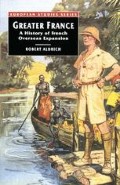Abstract
At its apogee in the 1920s and 1930s, France and its overseas domains — what some called ‘greater France’ (la plus grande France)1 — encompassed 11 million square kilometres of land and over 100 million inhabitants; Paris controlled the second largest empire in the world, second only to that of Britain. France’s possessions included African and South American jungles, islands in the Caribbean, the Indian Ocean and the Pacific, vast expanses of Saharan desert and Antarctic ice, enormous colonies such as Indochina and Madagascar, remote little-known outposts such as Wallis and Kerguelen, and toeholds in India and on the Red Sea. The French tricolour flag flew over the fabled city of Tombouctou and the legendary island of Tahiti. Colonial promoters lauded the benefits of an empire they said provided international prestige, a secure place for investments, a market for France’s products, a source for raw materials and a reserve army of soldiers. Popular literature recounted the exploits of hardy explorers, courageous soldiers, kindly doctors and missionaries, pioneering farmers and miners, loyal natives. They promised an eternal marriage between France and its outposts over the seas. Anti-colonialists dissented, speaking about invasion of foreign countries, brutal conquest and exploitation, mistreatment of indigenous populations, appropriation of labour and natural resources, spoliation of land, and concerted attempts to destroy non-Western cultures, largely for the benefit of a few rapacious settlers and profiteering capitalists.
Preview
Unable to display preview. Download preview PDF.
Notes
Hanotaux, Histoire des colonies françaises, Vol. VI (Paris, 1933), pp. 551–67.
See John Hargreaves, ‘From Colonisation to Avènement Henri Brunschwig and the History of Afrique Noire’, Journal of African History, 31 (1990), 347–52.
See H.L. Wesseling, ‘Towards a History of Decolonization’, Itinerario, 11:2 (1987), 95–106.
See D.K. Fieldhouse, ‘Can Humpty-Dumpty Be Put Together Again? Imperial History in the 1980s’, Journal of Imperial and Commonwealth History, 12 (1984), 9–23
Copyright information
© 1996 Robert Aldrich
About this chapter
Cite this chapter
Aldrich, R. (1996). Introduction: Reading and Writing About the Colonies. In: Greater France. European Studies Series. Palgrave, London. https://doi.org/10.1007/978-1-349-24729-5_1
Download citation
DOI: https://doi.org/10.1007/978-1-349-24729-5_1
Publisher Name: Palgrave, London
Print ISBN: 978-0-333-56740-1
Online ISBN: 978-1-349-24729-5
eBook Packages: Palgrave History CollectionHistory (R0)

